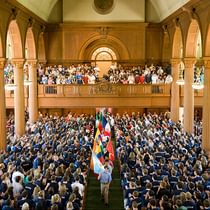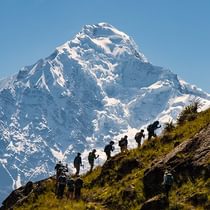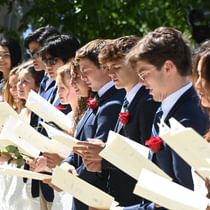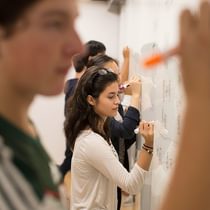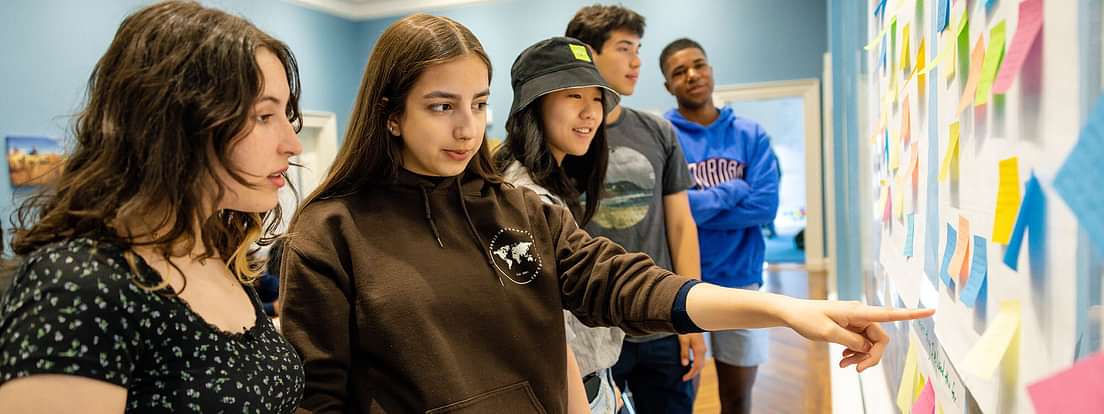
Intensely Interactive
Phillips Academy offers a liberal education oriented to all aspects of human experience. A liberal education affirms that knowledge is intrinsically good and denies that education terminates with technical skill or professional success. Resisting specialization in favor of breadth, it initiates students into connected fields of understanding and prepares them to lead lives characterized by learning and understanding, responsibility, and freedom.
Andover Faculty
We have more than 200 classroom teachers—nearly all of whom live on campus. They’re versatile, inspirational, and ever-present as teachers, coaches, academic advisors, house counselors, mentors, and lifelong resources.
Each instructor has their own teaching style and the skills to expertly educate the next generation of big thinkers and visionary leaders. Classes vary by department and discipline, ranging from discussion and inquiry-based to immersive and experiential. Every student learns differently, and every subject should not be taught in the same way. At Andover, we meet you where you are and challenge you to become the scholar you can be.
The Curriculum
Our diploma requirements are designed to ensure that Phillips Academy students complete a course of study in a broad range of disciplines and skills that, in the judgment of the faculty, provide the appropriate foundation for a liberal education.
Topics, texts, and materials occasionally may not win the full approval of all students or families. However, they will be selected carefully and thoughtfully within our academic departments, then presented and considered in managed contexts.
What To Expect
Junior
Lower
Upper
Senior & PG
Intro to Andover
Each trimester a junior takes either five or six courses, some of which are required for all juniors and others of which they place into based on ability. English 100 and History 100 are standard courses for juniors.
Students are placed into math, science, foreign language, and music courses based on demonstrated ability. In other words, juniors who have a particular aptitude for math, foreign language, or music and who wish to move ahead in one (or more) of those areas may do so by means of a placement test.
Additionally, ninth graders typically take one or two additional courses in the arts as their sixth course.
English 100
An introduction to the study of language and literature. “Every good writer was a good reader first.” – Helen Vendler
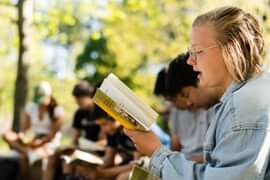
Visual Studies | Art 225
Students use a range of media (drawing, collage, photography, video, clay) to expand their perceptual, conceptual, and technical skills.

Foundations: The End Depends Upon the Beginning
Topics of transition, living and learning in a diverse community, stress management, and more.
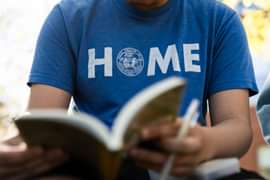
Choose Your Path
Each term a lower may take five or six courses. Entering Lowers must earn no fewer than three credits (combined) in art, music, and theatre and dance, with at least one credit each in art and music, during their Andover education to earn a diploma.
Incoming lowers come from a variety of different school settings and experiences and thus have very different levels of experience in math, science, and world languages. Each student has the chance to place into the appropriate level in these courses and work forward from there.
World History | History 201
The world from 1400–1800. Study economies of silver, the Atlantic slave trade, gunpowder empires, and religious reform and transformation.

Physical Education | PHD 200
Designed to teach lifetime wellness. An emphasis on self-improvement and personal challenges. Tackle an indoor ropes course.
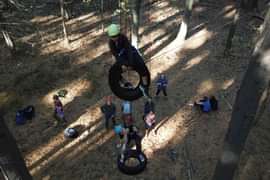
Endeavors of the Head, Heart and Hands
Empathy, balance and inclusion seminar covering topics of communication, healthy relationships, self-care, and decision-making.

Push Yourself
During the Upper and Senior years, a student must accumulate a minimum of 27 credits. Each term an Upper must take five courses. Language and math placement depend on each student’s demonstrated ability, which we assess through departmental placement exams. Science placement is determined by previous coursework and math level.
New Uppers may consult with our college counseling office prior to arriving on campus for guidance in planning their program of study.
Third-Level German | GER300A/B, INT300
A year-long focus on conversation, building vocabulary, advanced grammar, and interdisciplinary study of Berlin culture and history.
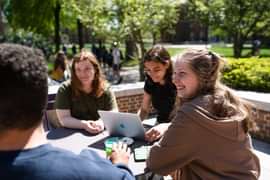
The United States | HSS300
Learn the narrative of American history while honing skills in reading, note-taking, and in-depth study of organizing themes.

The Final Year
Seniors are expected to take five courses each term. A student must accumulate a minimum of 27 credits. A credit equals one course taken for one term. A Senior must earn a minimum of 12 graded term credits during the senior year. Seniors must have passing term grades for all courses taken during their spring term in order to graduate.
Molecular and Cellular Biology: Laboratory Research | BIO600
Learn techniques through work with model organisms and experimental systems such as bacteria, mammalian cell culture, and C. elegans.
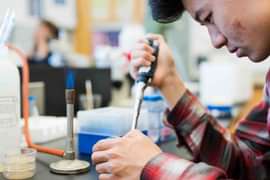
Honors Computer Science Seminar | CSC630
Go beyond the College Board’s AP curriculum. Push yourself on such topics as data visualization, open source software, and algorithms.
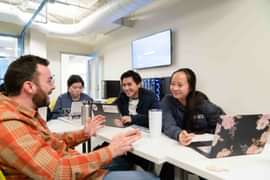
Your Daily Schedule
See what a typical day at Andover is like from students in every grade.
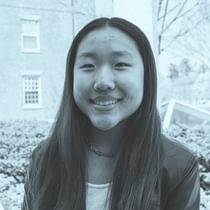
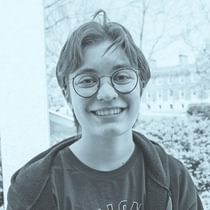
Max, Upper
“Andover is intentionally made a lot smaller through different levels of community like the cluster system.”
view full profile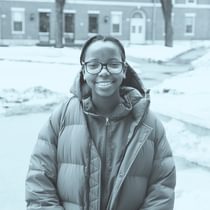
Adaora, Lower
“I’m still as excited as when I first applied. It’s literally everything that I wanted it to be, and I’m just really happy that I’m here.”
view full profile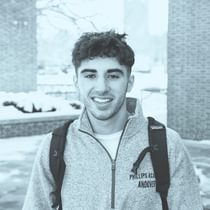
Joe, Lower
“My dorm is filled with a great group of guys. My friends make it feel like home.”
view full profile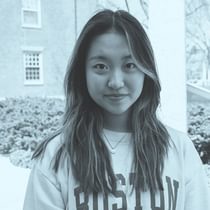
Ashley, Upper
“Andover is an amazing place to express yourself creatively. I love being a dancer and playing clarinet in our chamber orchestra.”
view full profileCourses
We offer more than 300 of them. They are small (average class size: 13) and intensely interactive. They fall into roughly these categories: the arts, English, world languages, history and social science, lab science, math (including statistics and computer science), and philosophy and religious studies. Most students take courses in all of these fields. Some are interdisciplinary. Some are college level. All of them are designed to inspire a lifelong love of learning.
Never complacent, we are always asking our students how Andover can enhance their academic experience. Along with creating opportunities to explore topics more deeply, we make sure students have the time to reflect on—and savor—their intellectual growth.
“We have so much freedom here. We’re not reading from a prescribed set of books; we’re doing this because we want to learn. And I think as a result, the level of discussion in incredible.”
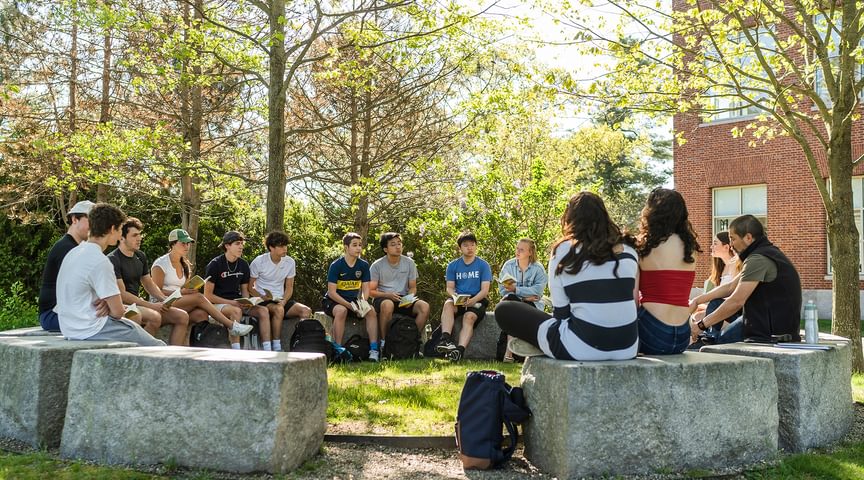
[footnote]
Important! We call 9th-graders "juniors," 10th-graders "lowers," 11th-graders "uppers," and 12th-graders "seniors."
Learning happens inside and outside the classroom at Andover. Sometimes classes just happen outside, like in front of the Memorial Bell Tower or at the Jean St. Pierre Memorial classroom.
A Quick Sampling From Our Course of Study
Rememories: Trauma and Survival in 20th-Century Literature
Students look closely at how trauma literature both delineates and breaks down divisions within individual, societal, and generational trauma experience, engaging with course texts by writing in a number of modes, both critical and creative.
Visual Culture: Curating the Addison Collection
Students have the opportunity to explore the collection of the Addison Gallery of American Art, specifically its robust photography holdings in order to stage a collaborative exhibition of their own.
History of Financial Crises and Civic Reactions (1700s–present)
Evaluate a selection of case studies between 1720 and the present, placing yourself in the shoes of one or more protagonists and at a point where one must analyze the issues, make a decision, and recommend action.
Baseball and Philosophy
Explores topics in philosophy and applied ethics through the lens of America’s Pastime: baseball. Class topics may include parallels between sports fandom and religious belief and belonging; the proud but furtive history of “lying” and stealing signs in baseball; and the struggle for the American spirit.
ASTROBIOLOGY: LIFE AMONG THE STARS
We invite you to embark on a journey to explore the field of astrobiology, the study of the origin, evolution, and distribution of life in the universe, on and beyond planet Earth.
Environmental Science: Global Climate Change
Grasp the science behind the politics. Begin with an overview of climate science, including atmospheric composition, major biogeochemical cycles, principles of energy conservation and flow, the greenhouse effect, atmospheric and oceanic circulation, and natural climate variability. The second half of the course addresses the response to global climate change by investigating mitigation strategies.
Current Events and Multimedia: Approaches to the Hispanic World
A look at Spain, the Hispanic Caribbean, and Mexico while refining speaking, writing, and listening skills in Spanish while developing the ability to express current issues through a cultural context.
Empathy, Balance, and Inclusion (EBI)
As part of our co-curricular programming, all students meet with small groups of their peers to relax, reflect, and identify ways to be at their best as students and community members. EBI seminar sessions cover topics including understanding of self and others, communication, healthy relationships, self-care, and decision-making.
The EBI seminar for juniors, Foundations: The End Depends Upon the Beginning, meets for one period for seven weeks of each term and is facilitated by faculty members who are assisted by prefects or day-student mentors. Discussion topics include transition, living and learning in a diverse community, stress management, making friends, boundaries, reflections on positive habits around health and wellness, and asking for support.
The EBI seminar for lowers, Endeavors of the Head, Heart and Hands, meets for one period for seven weeks of each term and is facilitated by faculty members and specially trained members of the senior class, known as EBI Seniors. Discussion topics include resources to help us live well at Andover, identifying and living our values, mental health awareness, mindful decision-making, consent, implicit bias, structural inequity, and reflections on identity.
The EBI program for uppers and seniors, Connections and Transitions, brings one speaker per term on topics that center health education, cultural competence, social-emotional learning, and healthy relationships. It also includes complementary programming to encourage wellness, health, balance, and community building with events like Grit ‘n Wit, Senior Oasis, and Upper Carnival.




